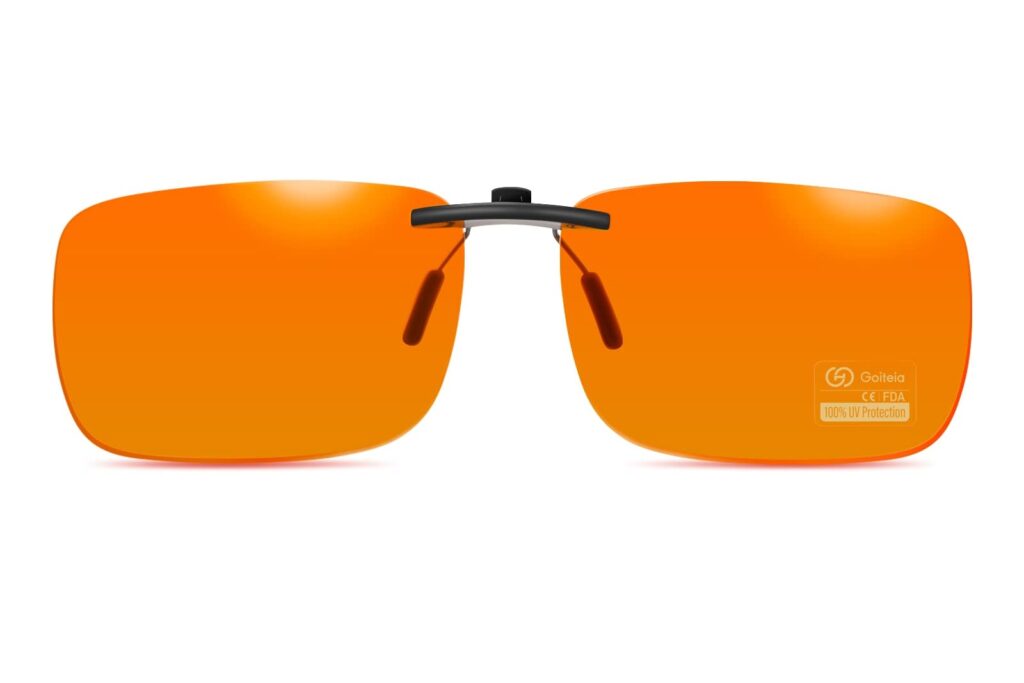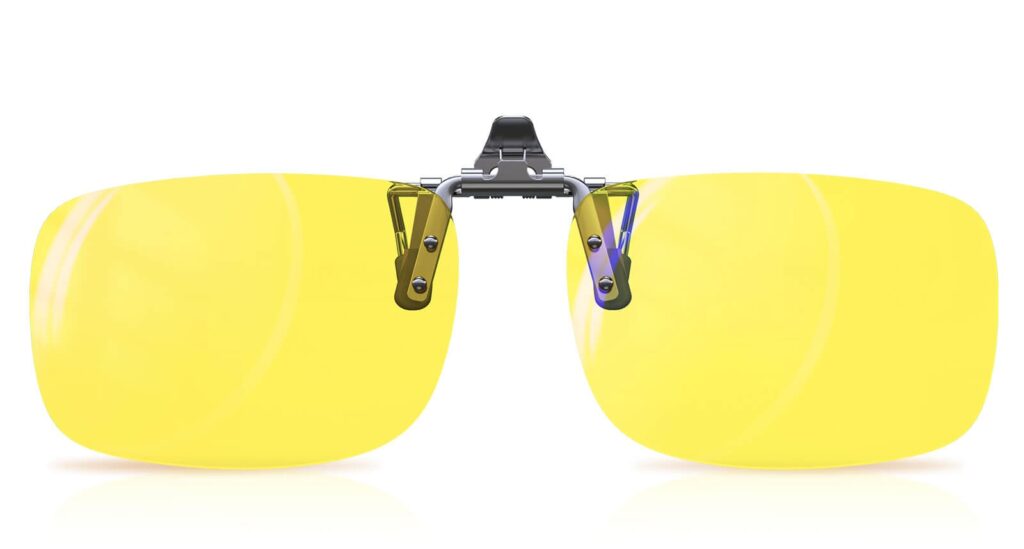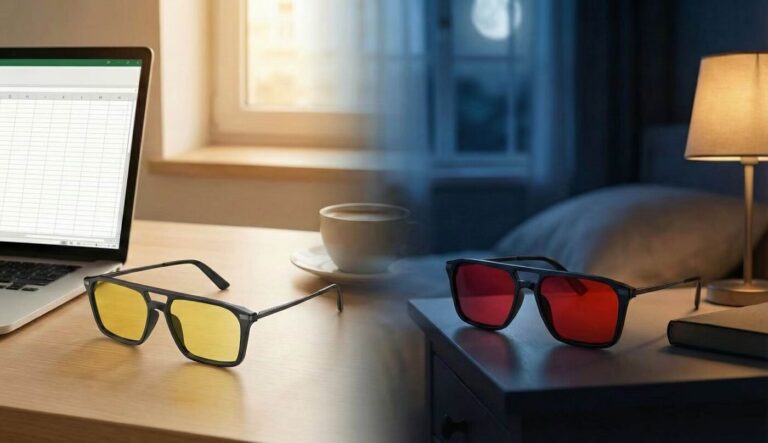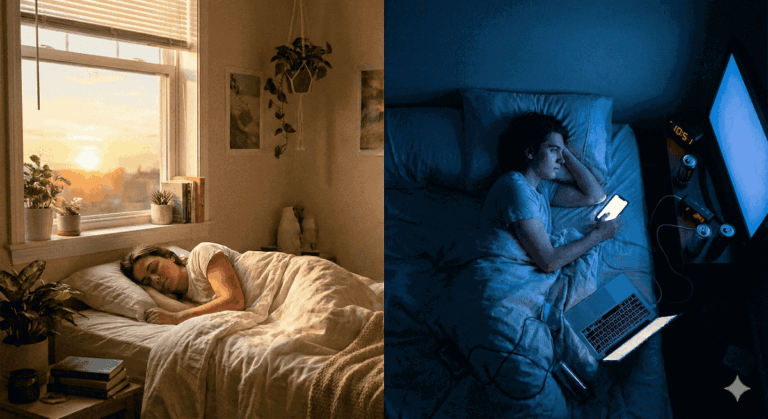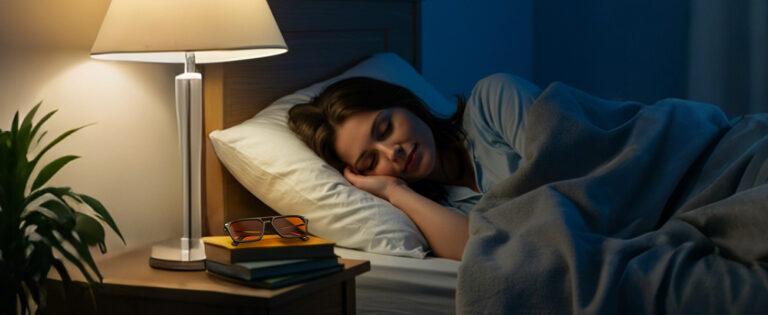Free UK/DE/FR/IT/ES/US Shipping, Other Countries (Free on Orders Over £50) SHOP NOW
In today’s tech-centric world, blue light computer glasses have become a popular accessory for managing eye strain and improving visual comfort. With our increasing screen time, it’s crucial to understand how these glasses work and how they can benefit you. This guide will provide you with a detailed overview of blue light computer glasses, their benefits, essential features, and tips for choosing the best pair.
The Role of Blue Light in Our Daily Lives
How We Encounter Blue Light in Everyday Activities
Blue light is an unavoidable part of modern life. It’s present in both natural and artificial forms. Every time you check your smartphone, work on your laptop, or watch TV, you’re exposed to blue light. This type of light has a high energy level and a short wavelength, which means it scatters more easily than other types of light. This scattering can make it harder for our eyes to focus, contributing to visual discomfort and fatigue.
Sources of Blue Light (Natural and Artificial)
Natural Sources: The sun is the primary natural source of blue light. It regulates our circadian rhythms and boosts alertness during the day. However, overexposure, especially during peak sunlight hours, can contribute to digital eye strain and other issues.
Artificial Sources: Modern technology is a major source of artificial blue light. This includes: Smartphones and Tablets: These devices emit a significant amount of blue light, which is why many people experience eye strain after prolonged use. Computers and Laptops: Essential for work and leisure, these screens are another major source of blue light exposure.
Televisions: Extended TV watching, especially at night, adds to blue light exposure. LED and Fluorescent Lighting: Common in homes and offices, these lighting options also contribute to blue light exposure.

Average Daily Screen Time Statistics
Recent statistics show that the average screen time for adults has increased significantly. Many people now spend between 6 to 8 hours daily on screens, whether for work, entertainment, or communication. This high level of screen time highlights the need for effective strategies to manage blue light exposure.
What Are Blue Light Computer Glasses?
Definition and Purpose
Blue light computer glasses are specially designed eyewear intended to filter out blue light from digital screens and artificial lighting. Their primary purpose is to reduce eye strain and improve visual comfort during prolonged screen use. These glasses are often confused with gaming glasses, but their functionality is essentially the same. Many users also prefer clip-on versions that can be attached to existing prescription glasses for added convenience.
How They Work
Blue light glasses work by incorporating lenses with coatings or filters that absorb or block blue light. These lenses are designed to reduce the intensity of blue light entering the eyes, which helps decrease glare, enhance contrast, and alleviate eye strain. There are two main types of blue light lenses:
Clear Lenses: These lenses block a portion of blue light while maintaining color accuracy. They are ideal for general use, including tasks like graphic design and video editing where color precision is important.
Tinted Lenses: Often yellow or amber, these lenses provide a higher level of blue light protection. They can help reduce eye strain and improve sleep quality by filtering out more blue light, although they may alter color perception.
The Benefits of Blue Light Computer Glasses
Prevention of Potential Eye Damage
One of the key benefits of blue light glasses is their potential to prevent eye damage. By reducing the amount of blue light exposure, these glasses help protect the retina from potential long-term damage. This is especially important for those who spend long hours in front of screens.
Alleviate Symptoms of Digital Eye Strain
Digital eye strain is a common issue for those who spend extended periods on screens. Symptoms include dryness, blurred vision, and headaches. Blue light glasses help alleviate these symptoms by filtering out blue light, which reduces strain on the eyes and helps improve comfort.
Affects Sleep Patterns
Exposure to blue light in the evening can interfere with melatonin production, the hormone responsible for regulating sleep. Blue light glasses can help reduce this interference by limiting blue light exposure before bedtime, potentially improving sleep quality and making it easier to fall asleep.
Enhanced Visual Comfort
Blue light glasses enhance visual comfort by reducing glare and improving contrast. This makes reading, working, or enjoying digital content more comfortable, as it minimizes visual fatigue and discomfort.
Addressing Myths and Misconceptions
Can You Wear Blue Light Computer Glasses All Day
Blue light computer glasses can be worn all day, especially if you spend extended periods in front of screens. They are designed to provide continuous protection and comfort during long screen sessions, so you don’t need to worry about wearing them throughout the day.
Do Blue Light Computer Glasses Work for All Types of Screens
Blue light glasses are generally effective for most screens, including computers, smartphones, and TVs. However, the level of protection may vary depending on the type and intensity of blue light emitted by different screens. It’s essential to choose glasses that offer adequate protection for your specific screen usage.
Can Blue Light Computer Glasses Help With Migraines
While blue light glasses can help reduce eye strain and visual discomfort, they are not a guaranteed cure for migraines. If you suffer from migraines, it’s best to consult with a healthcare professional to explore a comprehensive treatment plan that addresses your specific symptoms.

Must-Have Features for Blue Light Computer Glasses
Experts recommend several key features when selecting blue light glasses to ensure you get the best protection and comfort. Here’s what you should look for:
Blue Light Filtering Capabilities
Effective blue light glasses should have high-quality filtering capabilities. Look for glasses that block a significant percentage of blue light and check for certifications or test results that validate their effectiveness. This ensures that you are getting adequate protection against blue light.
Anti-Glare and Anti-Reflective Coatings
Anti-glare and anti-reflective coatings enhance the performance of blue light glasses by reducing glare and reflections. These coatings help improve visual comfort and reduce strain caused by light bouncing off your lenses.
Comfort and Fit
Comfort is crucial when choosing blue light glasses. Ensure that the glasses fit well and do not cause discomfort during extended wear. Adjustable nose pads, lightweight frames, and ergonomic designs contribute to a better fit and a more comfortable experience.
Applicable Use Scenarios
Consider your specific needs when choosing blue light glasses. Whether you need them for all-day computer use, late-night gaming, or reading e-books, select a pair that matches your typical screen usage. This ensures that the glasses provide the appropriate level of protection and comfort for your activities.
Clips and Ordinary Glasses
For those who already wear prescription glasses, clip-on blue light filters offer a convenient alternative. They attach to your existing glasses and provide blue light protection without the need for a separate pair. This makes them a practical choice for those who want to integrate blue light protection into their current eyewear.
Straightforward Advice for Finding the Best Blue Light Glasses
A Simple Way to Figure Out What You Need
To find the best blue light glasses for your lifestyle, start by assessing your screen habits and needs. Determine how much time you spend in front of screens and whether you need glasses for specific activities like gaming, working, or reading. This will help you choose the right type and features for your glasses.
Three Standards to Know How to Evaluate the Performance
Effectiveness: Evaluate the glasses’ ability to block blue light by checking the percentage of blue light filtered and looking for certifications or test results that confirm their effectiveness.
Comfort: Ensure the glasses fit well and are comfortable for long periods of wear. Look for adjustable features and lightweight materials to enhance comfort.
Durability: Choose glasses made from high-quality materials that are resistant to scratches and damage. This ensures that your glasses will last and continue to provide effective protection.
Conclusion
Choosing the right blue light computer glasses is an important step in reducing eye strain and improving visual comfort in our screen-dominated world. By understanding the role of blue light, the benefits of these glasses, and the essential features to look for, you can make an informed decision that enhances your overall eye health and comfort. Whether you opt for clip-on filters or full glasses, finding the best pair for your needs will help you manage screen time more effectively and protect your eyes from potential harm.
Frequently Asked Questions
How do I know if blue light glasses are working for me?
You can gauge the effectiveness of blue light glasses by monitoring your symptoms. If you notice a reduction in eye strain, headaches, and improved sleep quality, the glasses are likely working well for you.
How often should I replace my blue light glasses?
Replace your blue light glasses if they become damaged or scratched, as this can impact their effectiveness. If you notice a decrease in comfort or protection, it might also be time for a new pair.
Can blue light glasses prevent digital eye strain completely?
While blue light glasses can significantly reduce digital eye strain, they may not eliminate it entirely. It’s also important to take regular breaks from screens, practice good posture, and use proper lighting to further reduce eye strain.
Are there any side effects of wearing blue light glasses?
Blue light glasses are generally safe to wear. However, if you experience discomfort or visual distortion, it may be due to the lens tint or fit. Adjusting the glasses or consulting with an optometrist can help address these issues.
Can I wear blue light glasses while using prescription glasses?
Yes, you can wear blue light glasses over prescription glasses, or opt for clip-on blue light filters that attach to your existing eyewear. This provides the benefits of blue light protection without needing a separate pair of glasses.


